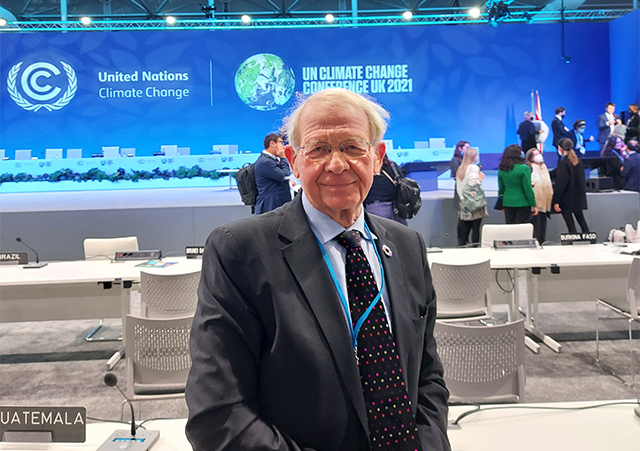 Carl Wright at COP26 in Glasgow.
Carl Wright at COP26 in Glasgow.
Opinions are divided as to whether the COP26 Climate Summit in Glasgow made real progress in addressing the global climate emergency or was just more ‘blah, blah, blah’.
Having attended the summit leading a delegation for the Canterbury Climate Action Partnership, including senior local government, business and community representatives, I feel the answer lies somewhere in between.
Certainly, there was momentum to progress towards Zero Carbon emissions and important new initiatives were agreed in respect to forest preservation, curtailing methane gas, phasing out coal, deploying electric vehicles and more. However, if all the existing promises are met the world would still be on course to a disastrous 2.4 centigrade rise in temperature by the year 2100, far above the 1.5 stipulated by the 2015 Paris Agreement. Nor is there much guarantee of the promised government targets being met and some of the worst offenders in carbon emissions, such as Australia, China and India were not party to the consensus on coal or, in the case of Indonesia, backtracked immediately after signing the agreement on forests.
Yet there is hope. Although the 71 paragraphs of the Glasgow Climate Pact will not save humanity, there will now be more frequent annual reviews of emission pledges, starting with COP27 in 2022. This will put political pressure on governments to continually tighten their emission targets by 2030. Indeed, unless there are significant global decreases in emissions in the current decade – and we are still way off target – Zero Carbon cannot be met by mid-century and 1.5 centigrade will be exceeded.
The was also recognition of the need for more finance to help developing countries adapt to climate change, even at the projected 1.5 level. Significantly, the concept of ‘loss and damage’ found its way into the Glasgow Climate Pact, helped by announcement by the Scottish First Minister to allocate funds towards this purpose – a marked contrast to the cut in ODA [Official Development Assistance] previously undertaken by the UK Government.
I was encouraged by the wide array of committed stakeholders present at the many pavilions of the COP26 Blue Zone These included representation from local government, business, community groups and indigenous peoples. As London Mayor Saddiq Khan, now Chair of the C40 big cities group, pointed out at one of the plenaries I attended, cities account for most of global carbon emissions. Mayors throughout the world are now taking concrete climate action to reach zero carbon: an outstanding example is Glasgow which is spending billions to reach Zero Carbon as early as 2030. Likewise, much of business is taking the climate crisis seriously: I heard a key US entrepreneur promise to convert his shipping fleet to use of hydrogen power and visited the E.ON energy centre in Glasgow which is pioneering smart use of sustainable energy in homes and offices.
There is therefore much that can be achieved by diverse stakeholders other than central governments, including by individual consumers and citizens. This is why in Canterbury we held a pre-COP Climate Action Week involving all our local stakeholders and engaging with our 140,000 citizens on Zero Carbon. Which is why we will be following up with Climate Action Awards in 2022 for individuals, schools, universities, community groups and business (see https://www.ccap.org.uk). This broad engagement will be vital to achieve Zero Carbon.
It was good to see pavilions of many Commonwealth countries like Ghana, Sierra Leone and even Tuvalu at the COP, in addition to those by the EU, USA and others. There was also a Commonwealth Secretariat pavilion attended by its Secretary-General. Unlike 2015, when Commonwealth heads of government played a key role in persuading India and others to agree to the Paris targets, I however did not see much evidence of a concerted Commonwealth impact on the final Glasgow outcomes, so vital especially to its many small island developing member states.
COP26 offers some respite from the climate emergency – but much more needs to be done by all stakeholders if climate catastrophe is to be avoided.
Dr Carl Wright, Secretary-General Emeritus, Commonwealth Local Government Forum and accredited delegate at COP26. He is also a member of the Round Table Editorial Board.
Related items:
A special climate change edition of the Round Table Journal [free-to-access]
Commonwealth leaders at COP 26 – Report and videos



